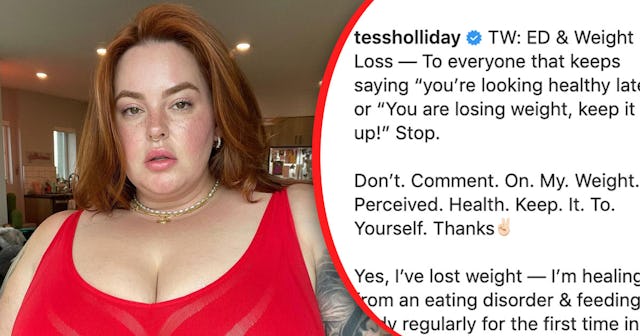Tess Holliday Reveals She's 'In Recovery' From Anorexia

Tess Holliday recently revealed on Twitter that she’s “anorexic and in recovery,” opening up on Instagram about her experiences with an eating disorder
Content warning: This article discusses eating disorders, weight loss, and anorexia
Model Tess Holliday is frequently open with fans on social media about her struggles with mental health, along with using her platform to discuss her relationship with body image and body positivity.
As a fat activist, she also shuts down unsolicited and unnecessary commentary about her health and appearance — but the mom of two just got more candid than ever, revealing that she’s “in recovery” from an eating disorder, reminding internet trolls and body-shamers that people of all sizes can struggle with disordered eating, and that it’s never okay to comment on someone’s “weight or perceived health.”
Holliday first took to Twitter last Friday, April 30th, to address speculation about her weight. She wrote, “To everyone that keeps saying ‘you’re looking healthy lately’ or ‘You are losing weight, keep it up!’ Don’t. Comment. On. My. Weight. Or. Perceived. Health. Keep. It. To. Yourself. Thanks.” In a subsequent tweet, she added, “Healing from my eating disorder & everyone is out here thinking it’s okay to comment on my weight loss.”
The next day, she followed up with a tweet specifying that she is “in recovery” from anorexia nervosa, an eating disorder defined by the Mayo Clinic as “characterized by an abnormally low body weight, an intense fear of gaining weight, and a distorted perception of weight,” with behaviors including restricting food intake, inducing vomiting after eating, excessive exercises and weigh-ins, and/or abusing laxatives, diet aids, diuretics, or enemas.
“I’m anorexic and in recovery. I’m not ashamed to say it out loud anymore,” Holliday wrote on Twitter. “I’m the result of a culture that celebrates thinness and equates that to worth, but I get to write my own narrative now. I’m finally able to care for a body that I’ve punished my entire life and I am finally free.”
She then opened up further about her experiences in a post on Instagram, reminding her followers that even if you think it’s positive to compliment someone on a perceived weight loss, that you have no idea what they might be going through behind the scenes.
“Yes, I’ve lost weight — I’m healing from an eating disorder & feeding my body regularly for the first time in my entire life,” she captioned her post. “When you equate weight loss with ‘health’ & place value & worth on someone’s size, you are basically saying that we are more valuable now because we are smaller & perpetuating diet culture… & that’s corny as hell. NOT here for it.”
https://www.instagram.com/p/COVvFzTHbSx/
“For folks like me that are trying to re-frame our relationships with our bodies & heal, hearing comments about weight is triggering as hell,” she continued. “It sets us back in our progress — and when people working on themselves see you commenting to me that way, it hurts THEM, not just me. I can take it (I shouldn’t have to, but I can) but they didn’t ask for that trauma, ok?”
She concluded by writing, “If you can’t tell someone they look nice without making it about their size, then baby, please don’t say nuthin at all.”
Holliday’s admission and candor should also serve as a reminder that even though anorexia conjures up images of thin (often white) young girls, that any person at any age, weight, or size can struggle with an eating disorder — but folks who don’t fit the stereotypical image are often ignored or even encouraged or congratulated for their disordered habits.
As a model and a public figure, Holliday is inundated with messages across multiple platforms both praising her when it looks like she’s lost weight and subsequently telling her that her “losing weight could save thousands if not millions of lives.” But no person on this planet — famous or not famous — deserves to be on the receiving end of commentary about their body. So please, the next time you consider congratulating someone if it looks like they’ve lost weight, or commenting about their body or health in any way, shape, or form, perhaps take a step back and keep it to yourself. Someone else’s body is no one’s business but their own.
If you or someone you know is struggling with an eating disorder, you can call the National Eating Disorders (NEDA) Helpline toll-free at (800)-931-2237, chat with someone at NEDA’s Helpline Chat, or text NEDA to 741-741 for 24/7 crisis support.